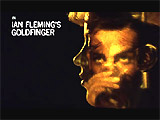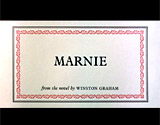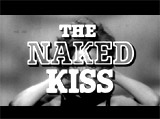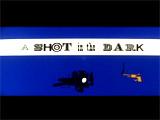
|
![]()
Greatest Films of the 1960s
1960 | 1961 | 1962 | 1963 | 1964 | 1965 | 1966 | 1967 | 1968 | 1969
Title Screen Film Genre(s), Title, Year, (Country), Length, Director, Description 


The Americanization of Emily (1964), 115 minutes, D: Arthur Hiller
This entertaining and daring satirical black comedy, with a screenplay by Paddy Chayefsky, was about the absurdities of war. It was set in 1944 during WWII - the main character was charming, callow, larcenous, scheming American Navy officer, Lt. Cmdr. Charles E. Madison (James Garner). His main job, residing in a swanky London hotel, was to be a "dog-robber" - to make sure his superior general, commanding officer Rear Adm. William Jessup (Melvyn Douglas), was comfortable and supplied (with everything from Hershey bars, to liquor, food, and Cokes). He was despised and called a womanizer ("a complete rascal") by his prim British war-widow motor-pool chauffeur and ambulance driver Miss Emily Barham (Julie Andrews), who had strong anti-American prejudices (what he termed: "sentimental contempt"). She hated his loud and brash ways, wastefulness, and avowed cowardice - although they did have romantic feelings for each other. Their situation drastically changed when the commanding admirals decided that they wanted the first American casualty of an upcoming dangerous mission (the D-Day invasion of Omaha Beach) to be a sailor - to be filmed for PR's sake, and Madison was ordered to arrange it when Admiral Jessup suffered a nervous breakdown. In the film's twisting conclusion, it appeared that Madison was killed by an exploding shell on the beach, and was subsequently lauded as a hero. However, he was wounded - with Jessup now planning to dub him "the first man on Omaha Beach."



Becket (1964, UK), 148 minutes, D: Peter Glenville


Dear Heart (1964), 114 minutes, D: Delbert Mann
This offbeat, sensitive black and white romantic comedy told about a "most unconventional love affair" that occurred over two and a half days between two middle-aged out-of-town conventioneers - they were total opposites. It also was taglined as: "'Dear Heart' Evie Jackson...tonight, she'd get herself a man and they'd never call her that again." Arriving in New York City for an annual Postmasters' Convention, single, lonely and dowdy spinster Evie Jackson (Geraldine Page), a post-mistress from small-town Ohio, met bachelor Harry Mork (Glenn Ford), a greeting cards traveling salesman. He was engaged and about to marry shallow widow Phyllis (Angela Lansbury) from Altoona, PA (the "tomato from Altoona"). Due to circumstances involving his soon-to-be stepson - Phyllis' 18-year-old, college student-son Patrick (Michael Anderson, Jr.) and his crazy girlfriend Zola (Joanna Crawford), Harry was invited to share a room with Evie. Inevitably, their destinies would converge further.



Dr. Strangelove: Or How I Learned to Stop Worrying and Love the Bomb (1964, UK), 93 minutes, D: Stanley Kubrick
Kubrick's classic, cynical Cold War, satirical black comedy, with scathing humor and timeless performances, was based on the novel Red Alert by Peter George and a script by Terry Southern. It was the first commercially-successful political satire about nuclear war, doomsday and Cold War politics. A crazed, anti-Communist psychotic US general Jack D. Ripper (Sterling Hayden), paranoid about his own sexual potency, sparked a nuclear crisis with a pre-emptive strike against "the Russkies." The American President Muffley (Peter Sellers in one of three roles) must deal with gung ho military brass Gen. Buck Turgidson (George C. Scott), bureaucratic bumbling, an incompetent Soviet ambassador, and a twisted, black-gloved German rocket scientist, Dr. Strangelove himself (Sellers again). It ended with the memorable bucking bronco image of Major Kong (Slim Pickens) riding the fatal bomb and howling wildly toward oblivion: "YAHOO!! YAHOO!!"



Fail Safe (1964), 111 minutes, D: Sidney Lumet




Goldfinger (1964, UK), 112 minutes, D: Guy Hamilton
The third entry in the long-running series of Bond films and the first official blockbuster for the franchise. Considered by most viewers as the quintessential 'Bond' film that set many precedents and the formula for future 007 films, including: Sean Connery's definitive portrayal of the MI6 agent, Bond gadgets, iconic 'Bond Girls,' the theme song and pre-credits sequence, classic lines of dialogue, the Aston-Martin, great action sequences, etc. After an initial pre-credits sequence set at a Latin America drug lord's laboratory, Bond (Sean Connery) was dispatched to investigate gold-obsessed bullion dealer-smuggler Auric Goldfinger (Gert Frobe) staying at a Miami hotel. During an affair with Goldfinger's mistress Jill Masterson (Shirley Eaton) there, Bond was knocked unconscious by Goldfinger's mute Korean servant Oddjob (Harold Sakata) with a lethal bowler hat, and Masterson was asphyxiated to death by gold body paint. During Bond's pursuit of Goldfinger to Switzerland, Bond assisted Jill's vengeful sister Tilly (Tania Mallet), but she also lost her life to Oddjob. Bond was captured and subjected to torture via a laser-beam. Bond later pursued Goldfinger at his stud-horse ranch in Kentucky where he learned of Goldfinger's grand plot, known as "Operation Grand Slam," to infiltrate the US Depository at Fort Knox, contaminate the gold reserve, and disrupt the world's economy. In the climactic scene at Ft. Knox, Pussy Galore's Flying Circus (five planes) took off and sprayed Delta 9 nerve gas over the Fort Knox area and the facility's troops to gain entry, not realizing the canisters had been changed. A showdown occurred between Bond and Oddjob, both caught inside as a bomb ticked down. Bond cleverly electrocuted Oddjob and the timer on the bomb was disarmed. Later, escaping villain Goldfinger hijacked Bond's private jet enroute to the White House, but suffered death when the plane decompressed by a gunshot and he was sucked through a window. Bond and sexy, lesbian-leaning, but converted private pilot Pussy Galore (Honor Blackman) parachuted to safety into the ocean with Bond before being rescued. Goldfinger was the first Bond film to win an Academy Award - its sole nomination for Best Sound Effects.
The Gospel According to St. Matthew (1964, Fr./It.) (aka Il Vangelo Secondo Matteo), 137 minutes, D: Pier Paolo Pasolini




A Hard Day's Night (1964, UK), 90 minutes, D: Richard Lester
The Beatles' first charming, wacky, original and impish movie was released not long after the Fab Four's landmark debut appearance on The Ed Sullivan Show. At first thought to be a cross-promotional exploitation of their phenomenal 'Beatlemania', even critics agreed that it was an inventive, funny and ingenious musical comedy that later helped to inspire the music video craze. Innovative American director Richard Lester used the same type of goofy humor and imaginative visuals from his earlier experimental, grainy, hand-held short film, The Running, Jumping and Standing Still Film (1959) starring Peter Sellers and Spike Milligan, along with black-and-white film stock and a semi-documentary style. Screenwriter Alun Owen based his Oscar-nominated script on the group's frenzied popularity, supplemented by musical interludes of concert footage. The frantic film documents thirty-six hours of the group's life as they are on their way from Liverpool to London for a TV performance, marked by the memorable opening intercut to the title song - as the singing group is chased by screaming, hysterical and obsessed teenage girls while they board a train. The rock-and-roll stars express their charming, laid-back, and saucy personalities in this slice-of-life film that fictionalized their lives -- best exemplified during their interview scenes with their dry, playful one-liner responses (Reporter: "Are you a mod, or a rocker?" Ringo: "Um, no. I'm a mocker"). Wilfrid Brambell also plays Ringo's "very clean," eccentric grandfather who serves as the film's trouble-maker. The Academy's membership unjustly overlooked the now-classic songs in the film's un-nominated soundtrack in favor of those from Mary Poppins ("Chim Chim Cher-ee"), Dear Heart, Hush...Hush, Sweet Charlotte, Robin and the 7 Hoods ("My Kind of Town"), and Where Love Has Gone. However, George Martin, the Beatles' producer often recognized as the "Fifth Beatle," was nominated for Best Adapted Score.
I Am Cuba (1964, Soviet Union/Cuba, or Я-Куба), 140 minutes, D: Mikhail Kalatozov




Marnie (1964), 130 minutes, D: Alfred Hitchcock
Director Hitchcock's psychological thriller - a tale of sexual perversity, a disturbed psychological state, and obsessive love - was a 'sex mystery' with the questioning tagline: "Would his touch end Marnie's unnatural fears or start them again?" In the film's opening, four brief sequences cleverly and economically presented clues to the main character's identity and appearance. The title character Margaret 'Marnie' Edgar (Tippi Hedren) was introduced as a con artist, liar and compulsive thief (kleptomaniac). With black-dyed hair as a disguise, she had stolen $10,000 from her place of work (a tax consultancy), and then adopted a new identity (as a natural blonde). It revealed a behavioral pattern that she had established for herself. Marnie was then hired as a typist at a Philadelphia publishing firm, where the owner - a wealthy widower and playboy Mark Rutland (Sean Connery), became romantically involved with her, in part as a challenge to try and understand her puzzling nature. With a disturbed psyche, Marnie was experiencing nightmares, severe panic attacks (occurring during a thunderstorm), and a phobic fear of the color red. Although Mark had discovered Marnie's embezzlement of funds, he kept her on as an employee and strangely blackmailed her into marrying him. During a much-debated rape scene, newly-wed husband Mark was with her during their honeymoon cruise to Fiji. He kissed her, ripped off her nightgown (the silky garment fell to her feet), embraced her, laid on top of her on the bed and took her (his face filling the entire screen). The sexually-frigid Marnie stared upward in a frozen, paralyzed catatonic state - completely lacking any passion or emotion, but then the scene cut away to a porthole. The source of Marnie's deep-seated problems, phobias, and prudishness were dramatically recalled during a nightmarish flashback - an incident that began to purge her problem. As a young 5 year-old (Melody Thomas Scott), she had witnessed her 20 year-old prostitute mother Bernice Edgar (Louise Latham) attacked by sex partner and pedophile sailor (Bruce Dern). When the client started to also kiss and molest Marnie, and Bernice called out for help, Marnie defensively delivered a blow to his head with a fireplace poker - she mortally-wounded the seaman, although her mother was the one who took the blame and stood trial for the self-defense murder. She was desperate for love, but couldn't allow a man to be intimately close to her. She had almost entirely erased the memory of the killing. The mentally-ill, cheating, lying and disturbed Marnie had secretly feared that she wasn't loved, and would never be loved or have children, so she compensated by stealing and cramming robbed goods into her purse or suitcases (a Freudian symbol of her empty womb). In the conclusion, Mark provided assurances when he spoke to Marnie to convince her to think more highly of herself, and not regard herself as a cheat, a liar and a thief. He also vowed to help defend her, told her that she wouldn't go to jail, and that they would work out their mutual marital problems.


Mary Poppins (1964), 139 minutes, D: Robert Stevenson
Disney's sugar-coated musical fantasy adaptation of the beloved P. L. Travers children's books won an Oscar for Best Original Score ("Chim-Chim-Cher-ee"), and featured Academy Award-winning Special Effects with its amazing blending of live action with animated cartoon characters, plus audio animatronics (i.e., the robin). A sequel came many years later, Mary Poppins Returns (2018), starring Emily Blunt. In the film's opening title sequence, prim and proper nanny Mary Poppins (Oscar-winner Julie Andrews in her film debut) was sitting on a cloud over Edwardian-era London with her talking parrot-headed umbrella while applying makeup. She was summoned to the Banks family's household at 17 Cherry Tree Lane after the children, Jane (Karen Dotrice) and Michael (Matthew Garber), wrote their own advertisement for a kind and sweet nanny, in opposition to their father's demands: ("Wanted, a nanny for two adorable children...(sung) If you want this choice position, have a cheery disposition...Rosy cheeks, no warts, play games, all sort. You must be kind, you must be witty, very sweet and fairly pretty, take us on outings, give us treats, sing songs, bring sweets..."). She materialized as per their wishes, dropped down and entered at a window (the children exclaimed: "It's her. It's the person. She's answered our advertisement. Rosy cheeks and everything"). Both parents, stodgy banker-father Mr. George W. Banks (David Tomlinson) and his oblivious, distracted wife and suffragette Mrs. Winifred Banks (Glynis Johns), needed a replacement nanny to help put their upset house in order. By singing songs to the children ("A Spoonful of Sugar" for example), she was able to easily discipline and coax them to behave and learn some of life's lessons. Carefree Cockney sidewalk street entertainer-artist (screever) Bert (Dick Van Dyke) was introduced to the kids. In a fabulous segment, the group jumped into a chalk sketch on the pavement that took Mary, Bert and the Banks children into an animated world, where they sang the catchy classic tune about a nonsense word: "Super-califragilistic-expialidocious." In another fantasy adventure, Mary visited with them at the home of Bert's jolly Uncle Albert (Ed Wynn) for a cheerful tea party held while floating to the ceiling ("I Love to Laugh"). Another time before the children visited their father's bank, Mary poignantly sang: "Feed the Birds" (pigeons), about an old bird woman (Jane Darwell in her final screen appearance) who would be selling breadcrumbs at St. Paul's Cathedral. Later, during Bert's cleaning of the Banks' living-room chimney, the scene moved up to the rooftop for a manic, fireworks-filled dance "Step In Time" by Bert and his fellow chimney-sweeps - it evolved into a huge Irish jig dance number on rooftops over London while dodging fireworks and cannon-blasts. In the film's major turning point, Mr. Banks told off his bank founder boss and chairman of the board - the elderly Mr. Dawes, Sr. (also Van Dyke): "Go fly a kite!" during his own dismissal. Happy now that he no longer worked at the stuffy bank, both he and Mrs. Banks took the children to the park for kite-flying ("Let's Go Fly a Kite"). In the triumphant finale, Mr. Banks was rehired and given a promotion by transformed, kite-flying Mr. Dawes who had a change of heart. With all of her tasks fulfilled, Mary Poppins took to the skies and sailed away.



The Masque of the Red Death (1964, UK/US), 89 minutes, D: Roger Corman



My Fair Lady (1964), 170 minutes, D: George Cukor
Best Director-winning George Cukor's Best Picture-winning film was one of the best and most popular musicals of all-time. It was adapted from Lerner and Loewe's Broadway musical play of the same name that ran for six years (1956-1962), that the two writers based on George Bernard Shaw's 1913 staged play Pygmalion that he had adapted from his own 1912 writings. The entire premise of all the derivations came from Latin poet Ovid's story of Pygmalion in his Metamorphoses. Arrogant, fastidious, and misogynistic linguistics Professor Henry Higgins (Rex Harrison repeating his Tony Award-winning performance on Broadway) in London casually wagered and challenged fellow linguist Colonel Hugh Pickering (Wilfrid Hyde-White) that he could transform a poor, Cockney flower-selling, street urchin Eliza Doolittle (Audrey Hepburn) - a 'guttersnipe' - into a proper lady with prescribed diction/elocution lessons, so that she could obtain a respectable job working in a flower shop rather than selling flowers on the street. The irrepressible 'guttersnipe' was scrubbed, dressed, and tutored by her impatient and tyrannical teacher. During her torturous six-month elocution lessons (such as "The rain in Spain stays mainly in the plain"), she suddenly caught on how to speak with a proper upper-class accent. Her unrepentant, calculating drunk father Alfred P. Doolittle (Stanley Holloway), a dustman, saw an opportunity to get rich ("With a Little Bit of Luck"). He appeared at Higgins' residence for a handout and was bought off. Eliza made an embarrassing first public appearance at the opening day Ascot Races, where she appeared to make a good impression initially, until by the racecourse, she shouted out in a vulgar Cockney accent: "C'mon Dover, move your bloomin' arse!" She also caught the eye of high-born aristocratic suitor, a poor Freddy Eynsford-Hill (Jeremy Brett), who was interested in romance ("On the Street Where You Live"), and a love triangle formed. She posed as a mysterious noble duchess at an Embassy ball, and was a personal triumph within the Edwardian high society. There, a Hungarian phonetics specialist Zoltan Karpathy (Theodore Bikel) trained by Higgins vowed she had to be an imposter. He claimed that she couldn't be English because her speech was so impeccable for a native. Eliza won her reluctant teacher's love, but then stormed off after being transformed (and Higgins won the bet) when her callous tutor wouldn't acknowledge her hard work or allow her kindness and even a certain degree of equality ("Why Can't a Woman Be More Like a Man?"). Although she was about ready to marry Freddy, Higgins realized that he really had an affection for Eliza: ("I've Grown Accustomed to Her Face") - and she returned to him by film's end. She appeared in his doorway with her old accent: "I washed my hands and face before I come, I did." The film concluded with Higgins' final line, asking for his slippers that Eliza had earlier thrown at him: ""Eliza ... Where the devil are my slippers?"



The Naked Kiss (1964), 90 minutes, D: Sam Fuller

The Night of the Iguana (1964), 125 minutes, D: John Huston



The Pawnbroker (1964), 114 minutes, D: Sidney Lumet
Director Sidney Lumet's mainstream, documentary-styled, b/w, socially-conscious psychological urban melodrama (shot on location) was replete with a number of quick flashbacks and montages to reveal the protagonist's horrific remembered-past as a concentration camp survivor. It was the first US film to show a woman nude from the waist up with bare breasts that was granted a Production Code seal because the nakedness was integral to the story, and the film was enhanced with a jazzy Quincy Jones score. The opening prologue was a slow-motion, nostalgic, and idyllic mid-summer memory of a young, happy Jewish man (a university professor) with his wife, his children and older relatives in an open country meadow, when suddenly the images were jarred or interrupted by an unknown menace (the arrival of German Nazi officials in a car). Twenty years after the war (and after his wife's death), Nazi concentration camp sole survivor and emotionally withdrawn, embittered pawnbroker Sol Nazerman (Best Actor-nominated Rod Steiger) worked in a grimy, claustrophobic Spanish and East Harlem pawnshop (at 116th St. and Park Ave.), and supportively lived with his sister-in-law Bertha (Nancy R. Pollack) in a suburban home on Long Island, with her two squabbling teenaged children. He had a distant relationship with Tessie (Marketa Kimbrell) (another camp survivor) with whom he slept and played cards, and he supported both Tessie and her father-in-law Mendel (Baruch Lumet). Sol also suffered through a cold acquaintanceship with friendly, middle-aged spinster social welfare worker Marilyn Birchfield (Geraldine Fitzgerald). Sol's shop assistant was brash, ambitious young Puerto Rican Jesus Ortiz (Jaime Sanchez), a reformed criminal, who was interested in a friendship and mentoring relationship with the closed-off Sol. Throughout the film, a series of quick-cutting flashbacks represented Sol's disturbing and associative memories of concentration camp horrors. Sol became very concerned and suffered a crisis of conscience when he learned that his silent black business partner-backer Rodriguez (Brock Peters), a local crime boss, was using the unprofitable pawnshop as an illegal front to launder money for his rackets - and brothel businesses. The fact that the pawnshop was being used to promote prostitution was a trigger to recall memories of his dead wife's rape in the concentration camp. After Sol told Rodriguez that he refused to accept money from a brothel, he was beaten into submission to comply. In the film's most controversial scene, a black prostitute (Thelma Oliver), Jesus' girlfriend who was employed by Rodriguez, bared her breasts for Sol in exchange for money. Because Sol interpreted sex as dark and evil, he covered the young topless woman with her raincoat, and gave her a $20 dollar bill. After learning about Jesus' and the hooker's connections to Rodriguez, Sol cruelly denounced the young boy (and any association with him) and told him: "You are nothing to me." Jesus became involved with old criminal neighborhood buddies in a plot to rob the shop. He was prompted to turn spiteful against his employer Sol, after Sol's cruel comment, but Jesus insisted to his accomplices that no guns would be used during the robbery. However, in the depressing and tragic conclusion, an armed robbery was led by a neighborhood gang leader Tangee (Raymond St. Jacques) and two thugs - the theft was connected and visualized as the ominous arrival of the three German officials in the film's opening. The thugs mercilessly beat up Sol when he refused to cooperate and turn over money to them. During the assault, Jesus stepped in to try and save Sol when a gun was aimed at him, and he was accidentally hit by the gunshot - Jesus crawled out to the sidewalk and died in the street, after confessing: "I said no shootin'. No to hurt you." Sol realized that Jesus had sacrificed his life for him - and attempted to scream with his mouth grimacing and wide open, but with no sound emerging. Shockingly and cathartically, Sol's skewered and punctured his hand on a sharp metal receipt spindle in the shop used to hold pawn tickets or receipts - the self-inflicted wound was intended to force him to feel the physical pain and restore his humanity.



A Shot in the Dark (1964, UK/US), 101 minutes, D: Blake Edwards



Topkapi (1964), 120 minutes, D: Jules Dassin



The Umbrellas of Cherbourg (1964, Fr./W. Germ.) (aka Les Parapluies de Cherbourg), 87 minutes, D: Jacques Demy


Woman in the Dunes (1964, Jp.) (aka Suna No Onna), 123/147 minutes, D: Hiroshi Teshigahara


Zorba the Greek (1964, UK/Greece), 142 minutes, D: Michael Cacoyannis



Zulu (1964, UK), 139 minutes, D: Cy Endfield